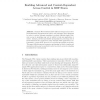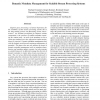124
click to vote
SEMWEB
2007
Springer
15 years 8 months ago
2007
Springer
Semantic Web databases allow efficient storage and access to RDF statements. Applications are able to use expressive query languages in order to retrieve relevant metadata to perfo...
123
click to vote
MTSR
2007
Springer
15 years 8 months ago
2007
Springer
Agricultural learning repositories can provide new opportunities for sharing, accessing, using and reusing learning resources online. Metadata plays a crucial role in such systems:...
127
click to vote
MIDDLEWARE
2007
Springer
15 years 8 months ago
2007
Springer
In self-adaptive systems, metadata about resources in the system (e.g., services, nodes) must be dynamically published, updated, and removed. Current middleware approaches use sta...
135
click to vote
ICADL
2007
Springer
15 years 8 months ago
2007
Springer
This paper describes our efforts to develop a toolset and process for automated metadata extraction from large, diverse, and evolving document collections. A number of federal agen...
108
click to vote
GRID
2007
Springer
15 years 8 months ago
2007
Springer
Abstract— Metadata annotations of Grid resources can potentially be used for a number of purposes, including accurate resource allocation to jobs, discovery of services, and prec...
113
click to vote
ECTEL
2007
Springer
15 years 8 months ago
2007
Springer
As metadata is often not sufficiently provided by authors of Learning Resources, automatic metadata generation methods are used to create metadata afterwards. One kind of metadata ...
107
click to vote
ECTEL
2007
Springer
15 years 8 months ago
2007
Springer
Knowledge Repositories can be a potential solution in order to cover agricultural professionals' lifelong learning needs. An application area of particular interest is the one...
143
Voted
WISE
2007
Springer
15 years 8 months ago
2007
Springer
What are the possibilities of Semantic Web technologies for organizations which traditionally have lots of structured data, such as metadata, available? A library is such a particu...
100
Voted
IPPS
2007
IEEE
15 years 8 months ago
2007
IEEE
As computing breaches petascale limits both in processor performance and storage capacity, the only way that current and future gains in performance can be achieved is by increasi...
112
click to vote
ICDE
2007
IEEE
15 years 8 months ago
2007
IEEE
Adaptive query processing is of utmost importance for the scalability of data stream processing systems due to the long-running queries and fluctuating stream characteristics. An...






